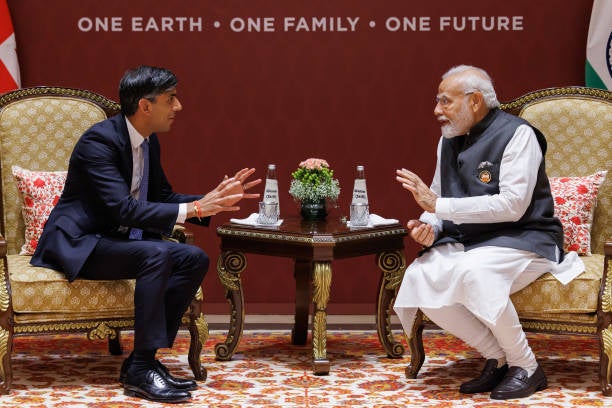Indian delegation in UK for final push on free trade agreement
Negotiation began in 2022 on deal that aims to double trade between the two countries to £86bn by 2030

An Indian delegation has landed in London to iron out the differences in the long-delayed and ambitious free trade agreement (FTA) between India and the UK.
The visit assumes significance in terms of timing as elections are expected to be announced in India in less than a month, which will trigger the Model Code of Conduct, restricting the ability of Indian prime minister Narendra Modi’s ability to announce the deal.
The visit comes almost a month after a delegation from the UK arrived in New Delhi to discuss the remaining aspects of the 26-chapter agreement. The negotiation began in 2022 on the deal that aims to double trade between the two countries to £86bn by 2030. India hopes to increase exports of leather, jewellery, textiles, and food products, with post-study work visas and immigration for Indians to the UK big areas of priority.
Britain, meanwhile, aims to double its total exports to India, up to as much as £28bn a year by 2035, thereby increasing wages across the UK by up to £3bn. The UK also wants an agreement that includes cutting tariffs on exports of British-made cars and Scotch whisky.
The fourteenth round of negotiation, which began on 10 January, involves discussion on matters related to goods, services and investment. Officials involved in the discussion claimed that the majority of issues in the proposed FTA were either finalised or were at an advanced stage of discussion.
"The majority of the chapters are either closed or at an advanced stage of negotiation. Discussions are being held at the higher level as well as at the team level to iron out differences,” said L Satya Srinivas, additional secretary in the Department of Commerce, earlier in January.
The India-UK FTA talks have hit several roadblocks and the ambitious pact now stands delayed by over a year from its previous deadline. The deal is reportedly being held up by a variety of issues, including a disagreement over the number of visas for Indians to work in the UK and differences over the level of access British car manufacturers should be given to India’s market.
Then interior minister Suella Braverman sparked a row in 2022 with comments about the possible impact of Indian migrants in trade talks, citing concern both with any “open borders migration policy with India” and those who overstay visas. A spokesperson for prime minister Rishi Sunak later said the UK had no plans to change its approach to reducing net migration in order to help secure a free trade deal with India.
However, India’s High Commissioner to Britain Vikram Doriaswamy said that the notion India wanted more visas had been in the British press but not in Indian media.
“We never said that the visas are part of our ask,” he told Times radio, adding that India instead sought simpler ways for companies to move UK and Indian nationals between the countries. “We are not asking for migrants to be able to come here.”
For India, a deal with the UK would be its first with a developed country after it signed an interim trade pact with Australia in December 2022. It comes at a crucial time for Mr Modi, who is looking to solidify India’s business-friendly image in the run-up to national elections.
Britain, on the other hand, has prioritised a deal with India as part of its Indo-Pacific foreign policy tilt aimed at enhancing ties with the region’s fast-growing economies.
The British Department for Business and Trade earlier said "the UK and India continue to work towards an ambitious trade deal that works for both countries. We have always been clear we will only sign a deal that is fair, balanced and ultimately in the best interests of the British people and the economy".
Join our commenting forum
Join thought-provoking conversations, follow other Independent readers and see their replies
Comments
Bookmark popover
Removed from bookmarks